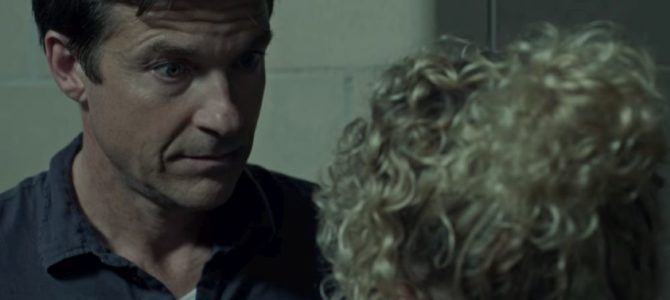
Spoilers follow.
“Ozark,” Netflix’s recent addition to the genre of suspense-driven, cortisol-boosting crime dramas, is a show that lays bare the dual nature of contemporary American whiteness. In it, the upper-middle-class Byrde family is ousted from their privileged lifestyle and plunked down in the middle of Missouri, a state for which the NAACP just issued a travel advisory as being unsafe for minorities.
Jason Bateman plays financial advisor Marty Byrde, who has been coerced, not entirely unwillingly, into laundering money for a violent Mexican drug cartel that prioritizes money and power over human life. Under threat of death, Byrde and his wife Wendy Davis Byrde (Laura Linney), relocate their family from Chicago to the Ozarks to embark on a lifestyle of money laundering. The stable family infrastructure they have spent their adult lives building is wiped out in an instant.
Prior to their crazed exodus, the Byrdes are the epitome of an elite, white, wealthy, city-dwelling family. Living in a well-appointed home in suburban Chicago, they had multiple savings accounts and assets, which when liquidated come to just about $8 million. The children, Charlotte (Sofia Hublitz) and Jonah (Skylar Gaertner) are private school kids with resume-building extra-curriculars like mathletes and swim team. This is a family of white people who feel secure in their social success. They don’t realize that their success is finite, and only exists within given boundaries.
It is when they step outside of those boundaries that everything they thought their wealth and enlightened educations protected them from comes surging up from the depths to destroy them. The first of these things is the criminal underworld, in the form of an El Chapo-style Mexican drug lord who creates every opportunity to remind Byrd that he will kill the entire clan if his demands are not fulfilled. The second is the other white America.
‘This Place Is Death’
If there’s any one racial or ethnic group that it’s still socially cool to dump on, it’s poor white people. “Ozark” shows us why. It is because these people represent everything fancy whites have been trying to distance themselves from. The white people of the central Missouri Ozark lake district are shown as dirty, uneducated, petty, self-hating, malevolent, unloved, greedy homophobes. They are the working-class, broke-ass whites the country has been blaming for the Trump presidency.
The “Ozark” yokels are what the progressive left believes is the id of white America. They are who, and what, the elite whites of the coasts and cities despise. All the articles about how progressive whites need to educate their backwards relatives at family reunions are about exactly these types of people. That’s all well and good from the vantage point of a Chicago high-rise, but when face to face, or property line to property line, with these people, the educating goes the other way.
In episode seven, “Nest Box,” Wendy and Marty talk openly about what they’re facing and its impact on their daughter Charlotte. “We are way past any point of assimilation here,” Wendy remarks. “We took her life away. Everything she thought was safe was a lie. I know what’s here… it’s the shit you run away from. It’s pick-ups and warm beer and low expectations. It’s grown men with bourbon on their breath who lean in a little too close and say ‘My, how much you’ve grown.’ She needs to go back to Chicago… This place is death.”
We Might Be White, But We’re Not Those Whites
Elite whites are told, through countless articles and podcasts, that they are just as bad as the hicks beyond the city lines, perhaps even worse. Their racism shines in the form of microaggressions, an unwillingness to perform their role properly as allies, and the upholding of systemic racism. No matter how much of the guilt of racism urban-dwelling educated whites take on, they want desperately to believe that they are better than the know-nothing rednecks out there in the greater United States who are not even aware of their guilt.
The backwater bumpkins are the unfettered, violent, capitalist underbelly of the United States, and while the coastal elites play in the rippling surf on the surface of reality, they fear what lies beneath, and the undertow that could suck them in. Without the brilliant educations, 401Ks, and high-end sectionals, who are they? According to the writers of “Ozark,” they are just more shitty white people aiming to take care of their own, no matter the cost.
It is fascinating to watch as the Byrde family, representatives of the white superego, become no better than the scheming, other-hating locals of Ozark. For fancy whites secure in their retirement assets and NPR tote bags, watching this family sink to new lows brings out their worst fears, that of subjecting their precious children to the viscera of rural white America, and of losing the stability of wealth.
Malevolence, fear, and a penchant for destruction lurks around every corner in “Ozark.” Everyone’s trying to kill Marty, and that amount of stress is enough to make anyone succumb to his most base, preservationist self. It’s enough to turn the weak heart to darkness by playing on its most tribal fears. It’s too late for Marty to alter the choices he made in the name of securing a more robust financial future that brought them here.
What Rich White People Want
Lasting stability is the holy grail for upper-middle-class white folks. While people feel good about their impulse to swell their bank accounts in an attempt to stave off tragedy, the sacrifices to law and order made in its name bring destruction. Byrd faces this destruction, in large part of his own making, by committing to a course of self-sacrifice in an attempt to get his family through it alive.
Christian Toto’s article in this publication would have us believe that this is a valiant attempt, and that Byrde is a sympathetic anti-hero. But protecting one’s family from one’s volitional sins is not a valiant act. It is the desperate act of a man who wants to right his wrongs so badly that he tries to change the definition of right to suit his own actions rather than confront the choices he made to bring him here.
The family is put into a situation where all the rules to which they once adhered, all the boundaries they dared not cross, are meaningless. But in losing everything, the Byrde family gains freedom to explore their worst selves. The pressure to try to be their best is gone, and in many ways, they relish it. Marty and Wendy engage with each other, expressing anger they’ve kept bottled for years. The children, freed from expectations, explore aspects of their nature that have been previously off-limits. Jonah takes up guns, Charlotte sex with a random cute tourist.
At Least the Hell Is Happening to Other People
Fighting for their lives makes them give up the ideals that have been guiding them. At no point in the season is this clearer than in Byrde’s final interaction with the preacher (Michael Mosley). Caught between a rock and Marty Byrde, the preacher has suffered horrible losses as a consequence of the family’s Ozark relocation. At the end of his rope, he tells Byrde, “There’s got to be a God, because there’s a devil. I think you’re the f-ckin devil.”
And isn’t Marty Byrde the devil? He is the white man: the colonialist, the interloper, the gentrifier. He is grieved when others are hurt as a result of his choices, but mostly he is just glad it’s not his family.
“I know you’re trying to take us someplace safe,” Charlotte entreats Wendy when mother and children are on the run, “but that place doesn’t exist… You made us adults the second you told us what Dad was doing. You can’t take it back now.” She’s right. The time to preserve the stability of their childhoods was before Marty became financial advisor to an international crime syndicate. The Byrdes can’t be elite whites with promising futures and residents of the other white America of Ozark. It’s one or the other.
The duality of whiteness on “Ozark” is certainly a zeitgeist that needs to be out in the open. It is the civil race war of a majority that stands on the threshold between the order and rationalism of a secure future and the chaos and depravity of existentialism made violently real. Lumped together under the identifier of white are a whole heap of people who see each other as foolish enemies intent on the other’s destruction.
Both groups have in common a sense of tribal protectionism, a belief that they are doing the right thing, and a willingness to do whatever it takes to protect their families. But a family cannot be protected from the sins of the father. Those sins must be acknowledged and dealt with according to the rules and laws that were broken. Otherwise the entire family is destined to reside in darkness.









